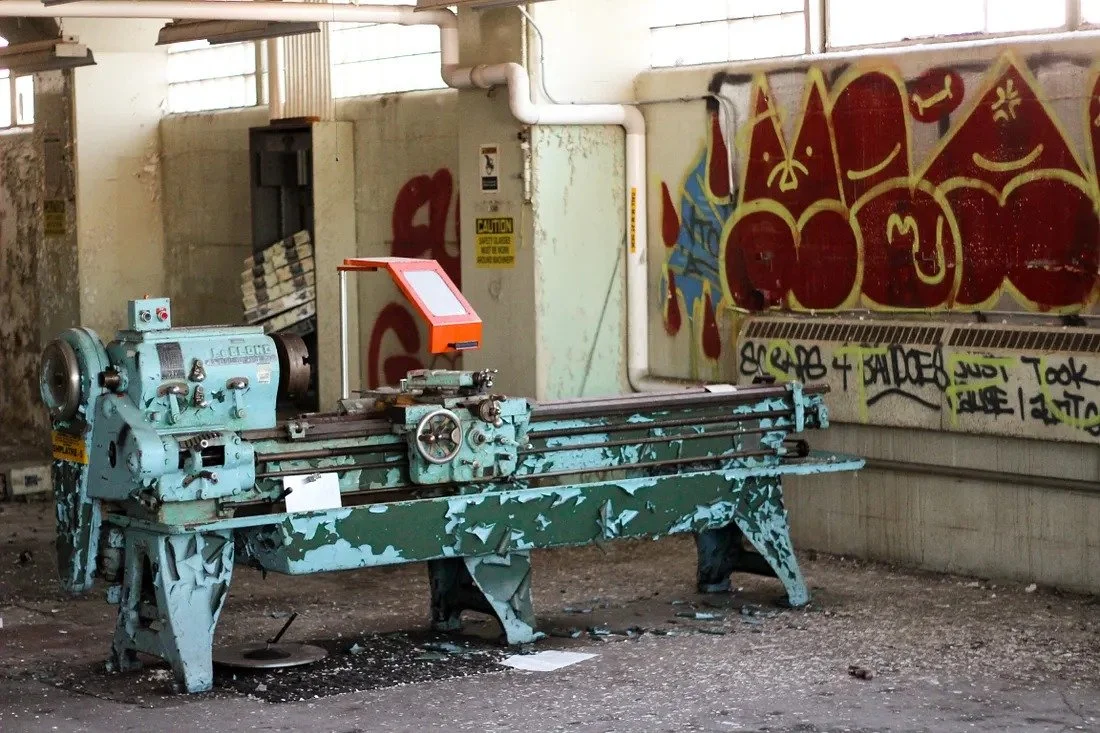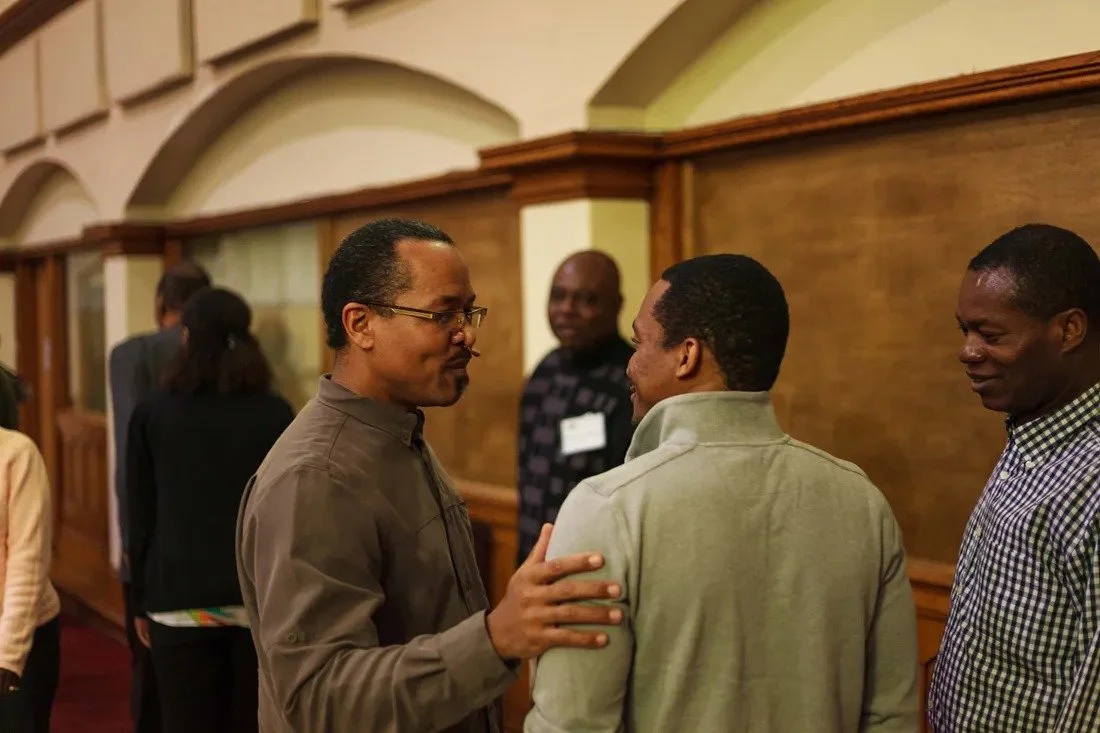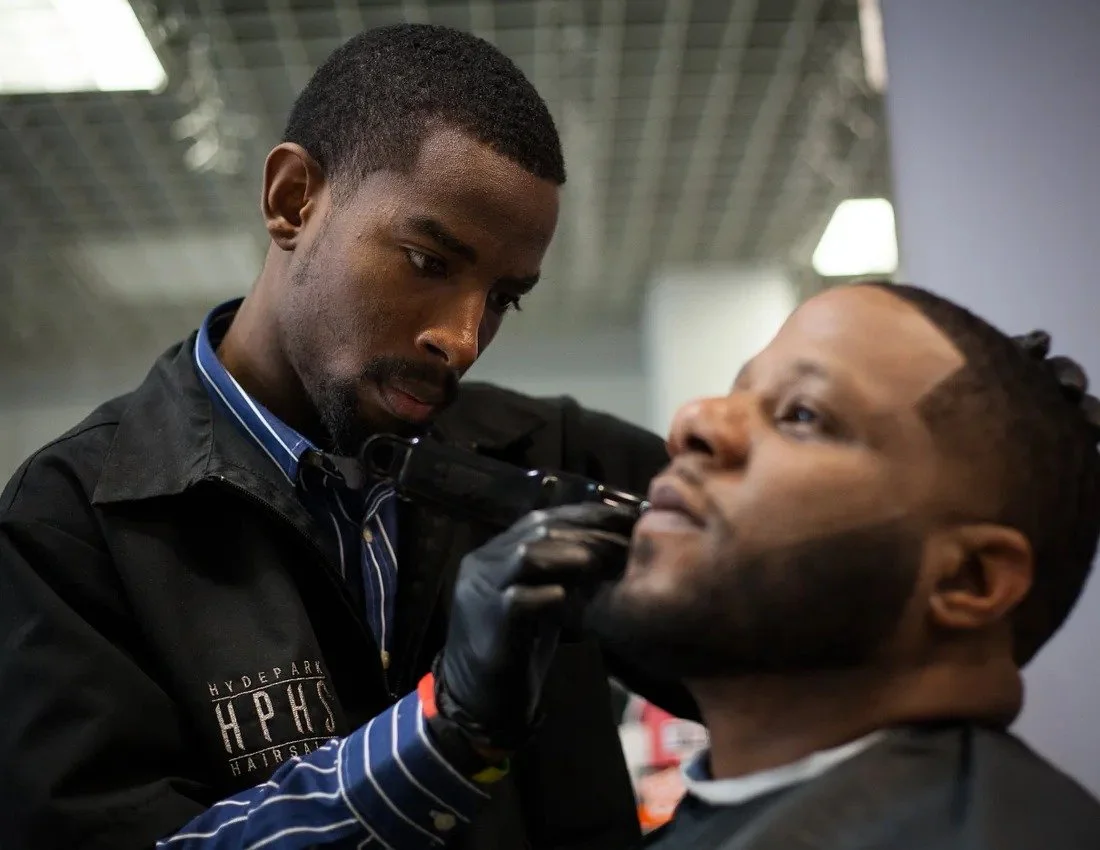The Effects of Unemployment and Poverty on Violence in Chicago
A piece from “Chicago Retold” — A project on the violence in Chicago.
by Elizabeth Kupferschmid
Ojo Patterson never expected to live more than 21 years. Patterson shared a house with his mother, siblings, and grandparents that they rented from his aunt in Englewood, a neighborhood on the southside of Chicago. When his aunt evicted his family, Patterson says his family never received government assistance for housing, but, “We did stay in abandoned houses devoid of electricity and water and stuff like that.”
In the winter, his family struggled to stay warm. “Some days it would be negative 2, negative 3 outside,” he said, “but because you’re in a house and you’re trapped, that house always felt like it was negative 30, negative 25; and me, my mom, my three siblings would be under a cover with a blow dryer to stay warm.”
This now-empty lot in Englewood is where Patterson and his family once lived in an abandoned building after being evicted from his aunt’s home.
Patterson learned a lot during those years, including how to illegally connect their houses to the city’s gas and electric supply. “It’s easy,” he said. “It’s dangerous, but it’s easy.”
When Patterson was eight, his father died of medical complications due to drug and alcohol addiction as well as lead poisoning from a bullet that had been lodged in his neck since he was 14. Patterson’s mother had not worked since before he was born, so at age 11, Patterson began doing seasonal yard work and helping in his grandfather’s retail store to help provide extra money for his family. At 12, he began dealing drugs.
Survival occupied Patterson’s thoughts during this time — his own survival, as well as the survival of his family. His siblings wore tattered, dirty clothing to school every day. “[To see them like that without helping] was more the wrong thing to do than for me to sell drugs in my eyes,” he said.
At the age of 17, Patterson used his drug money to rent an apartment for his mother and younger siblings. “I wasn’t [selling drugs] for no clothes and shoes, cars, and stuff like that. I was doing it, honestly, for my family. That was the only thing on my mind,” he said.
“I wasn’t [selling drugs] for no clothes and shoes, cars, and stuff like that. I was doing it, honestly, for my family. That was the only thing on my mind.”
- Ojo Patterson
Patterson’s plight is not unique.
Long-time resident of Englewood Keith Vosler, who has befriended members of as many gangs as he can (35 at this point), observed that many of the more violent teens are nearly homeless before they are even out of high school. If a family’s income is limited, parents often stop providing for their kids once they near their mid-teens, he said.
“The boys for the most part are let go at age 14 or 16,” he said. “They have to find a way to support themselves at that age.” The girls are let go when they have their first child. “Some are having babies at 12 to 14.”
The 2016 Chicago homeless report released by the Chicago Department of Family and Support Services (DFSS) revealed that in 2016, 309 youth under the age of 18 were homeless and unaccompanied by an adult.
However, Adriana Camarda, DFSS’s Chief Planning Analyst of the Homeless Division believes the actual number of homeless youths is higher than what’s reported. She said many young people do not want to be detected because they distrust the government and the foster care system.
Vosler explained that many adolescents in his neighborhood avoid sleeping on the streets by staying at various friends’ houses as long as they are permitted. “On any given day, someone can have three or four kids in their house. They’ll stay there for a couple days until they get put out, then they’ll just go to the next house,” he said. “They’re not homeless per se, but they don’t have a place they call home.”
Homeless teens end up in a bind trying to financially sustain themselves and their families, something many families expect of them. In some instances, Vosler said, “if the parents buy groceries with the kids’ money, they don’t allow the kids to eat it.”
In Chicago’s most impoverished neighborhoods, where young teens are being expelled from their homes, job opportunities are scarce.
According to a City of Chicago census completed in 2012, unemployment was as high as 34 percent in Fuller Park and 36 percent in West Englewood, two of the highest-ranking neighborhoods for both violence and property crimes. In neighborhoods such as these, jobs are available for only a fraction of local teens, Vosler said.
Uptown Baptist Church Pastor Michael Allen, who has lived in Chicago for 20 years, said many of Chicago’s lower-income neighborhoods have been left in poverty due to an evacuation of Chicago businesses.
Many factories in the Lower West Side neighborhoods of Chicago are now abandoned.
Chicago business owners are complaining because Chicago has the highest sales tax in the nation, a rising minimum wage, increasing property taxes, mandated sick-leave compensation, and taxes for water and sewer usage. Because of these mandates, businesses have been closing their doors and moving to regions outside Chicago. The exodus has left many people out of work.
Teens looking for work beyond the boundaries of their sapped neighborhoods are often trapped by violence. Sometimes as little as half a block can separate a person from another gang’s territory, Patterson said.
“You can’t get a job somewhere else,” Vosler said. “If you leave your neighborhood, you have a good chance of getting shot.”
“You can’t get a job somewhere else. If you leave your neighborhood, you have a good chance of getting shot.”
- Keith Vosler
Families, too, find it difficult to leave their neighborhoods because of the restrictions on affordable housing. Many families living in high-crime neighborhoods reside in subsidized housing, (commonly referred to as “Section 8”).
Under Section 8 regulations, residents are given a voucher to receive federal housing assistance within a certain price range. However, the vouchers do not integrate tenants with mixed-income neighborhoods. Rather, the vouchers only allot enough aid for the residents to move into other low-income, high-crime neighborhoods (Chicago Reader).
“The kids we’re talking about aren’t going to get jobs,” Vosler said. “They don’t know how to get a job because they don’t know how to respond if someone does something to wrong them, and they always think someone did something to wrong them.” The kids need to be mentored in daily life skills before they will be able to take advantage of given opportunities, he said.
Luther Bass, a resident of Chicago’s Humboldt Park neighborhood and former gang member, said the teens on the street grow up only thinking about their present situation. “[The kids] are just looking at that dollar,” he said. “It’s more about what they can get with the money. They’re not worried about their future as they should [be]. They’re worried about right here and right now.”
Teens develop this mentality while living in low-income neighborhoods, and it often lingers even after solutions have been presented.
When Patterson graduated high school, he was awarded seven college scholarships, totaling more than $30,000, but he gave each of them up. “Because of what I was shown my whole life and the mindset [I had], you’re not able to receive those things,” he said.
By that time, Patterson had assumed the role of provider for his family, and he feared what would happen if he left. “Because of the living situation of my mom and siblings, I couldn’t leave them. I stayed on the streets.”
Although Patterson blames noone but himself for missed opportunities, the “poverty mindset” is a hard thing to overcome, he said.
Money becomes the ruling authority to kids on the street, Bass said, and the pursuit of money replaces moral guiding principles. “Right or wrong to them is either you’re getting money or you’re not.” Patterson says this perspective is born out of fear in impoverished neighborhoods. “The fear of not having, that’s real. Not having the things that you need, not having the things that you want. Everybody don’t sell drugs because they need something. Most people nowadays sell drugs because they want something.”
Bass, a former member of the Latin Kings, was drawn into the gang while in high school when an older gang member began buying him expensive gifts. Bass said the Latin King became like a father to him since he never knew his real father, and he bought Bass new Nike Jordan shoes, a Cadillac, and 24” rims for his car, among other things. “They had money, I mean like a lot of money.”
Bass poses outside of his church, New Life Community in Humboldt Park.
As Bass became associated with the Latin Kings, he says he clung to the new identity the gang gave him. “I loved it. I just kept going and going. I found something that I thought, ‘This is me. I love this. I feel like Lil’ Wayne, one of the rappers.’”
After being charged with a misdemeanor, however, Bass realized it was difficult to recover. “When I went to get a job,” Bass said, “they looked at my record and said, ‘No, we can’t give it to you.’” This response pushes ex-felons back into the drug industry with more determination, he said.
Between the ages of 14 and 18, Patterson, too, was incarcerated three times.
“Most of our population has a criminal background,” Camarda said, referring to the homeless population monitored by the DSFSS. According to the 2016 Chicago homeless report, “Fifty-three percent of all homeless males and 26 percent of all homeless females surveyed reported spending time in either jail or prison.” Many landlords are reluctant to rent to those with a criminal past, she said. “An issue for many ex-offenders is that they are being discharged from jail or prison into homelessness.”
Patterson says there are many factors that influence the youth. “It’s not just what you see on the surface,” he said. “It’s never that.”
Allen said he believes physical environments alone are not enough to thrust teens into a life of crime. He cites the peaceful example set by the African-American community during America’s black slavery days to prove that a lack of opportunity does not single-handedly create ongoing violence. “I attribute that to the families that they’re growing up in,” he says.
Patterson and Allen are doing what they can to address mandates within Chicago that deny equal opportunities, hinder economic growth, and encourage criminal and violent activity.
Pastor Michael Allen greets people as they enter Uptown Baptist Church for Sunday morning service.
Allen is partnering with Bill Jones, Chairman of Cummins Allison, to create a team to advocate for policy changes within Chicago regarding the conduct of business. Cummins Allison is a manufacturing plant that was forced to move out of Chicago to the suburbs to escape rising tax laws and to increase its profit. Currently, Allen and Jones’ team is operating as a think-tank utilizing the expertise of its collective members, local leaders in everything from race to politics, business, and faith.
Allen hopes the team can affect change at both a political and communal level by partnering with ministries in Chicago communities. “Instead of us trying to parachute in there and mess things up, thinking we’re superman or God to change and fix everything, [we want to work alongside people],” he said. “God is already working in and through people on the ground in those neighborhoods, so we need to find out who they are.”
The team plans to use their gathered knowledge and experiences to strengthen their presence on the political level. “From all of that activity,” Allen said, “we then leverage our influence in the halls of government, local, state and Washington DC, to say, ‘These are our three asks of you.’” If the requests go unanswered, he said the people will need to exercise their right to vote out unyielding politicians and reelect those who are as concerned about the well being of Chicago as its citizens.
For the past three years, Patterson has been working with FORCE (Fighting to Overcome Records and Create Equality), an initiative of the Community Renewal Society (CRS). He partners with the group to bring about new legislation eliminating discrimination against those with criminal records.
The group visited the state capital on April 15th of this year, 2017. The purpose of these visits, Patterson said, was “to sit down with the senates [and] the reps, get to know them, keep our petitions before them, let people’s testimonies such as mine stay before them so they can hear where we’re coming from.”
CRS recently passed four bills in Congress repealing bars which forbade ex-felons from serving in school systems, the healthcare industry, or park districts for the rest of their lives. Even a juvenile drug offense had previously resulted in a life-time bar of the offender ever serving in a park district association. With CRS’s new bills, these bars have been reduced to three to seven years.
Patterson trims the hair of Marlon Chamberlain, Organizer for FORCE, at Patterson’s location in Hyde Park Barber Shop.
Patterson has been married for a little over three years and is currently running a successful business as a barber. Currently, he says, his family is doing well. His mother returned to work, his family obtained dependable housing, and his youngest brother is getting ready to graduate high school. Even now, however, Patterson cannot deny that during the dark days, drug-dealing provided a way for his family to survive.
“At the time that I first started,” he said, “if I wouldn’t have started then, where would I be? Where would we be?” Patterson said his involvement in drug activity was solely for his family. “It’s not justified,” he said, “it’s still wrong. I shouldn’t have been doing it. I’m accountable for that, and I know I’m forgiven through Christ; but it was different.”







